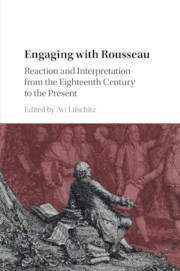Book contents
- Engaging with Rousseau
- Engaging with Rousseau
- Copyright page
- Contents
- Notes on contributors
- Preface
- Book part
- Note on the texts and references
- 1 ‘A lover of peace more than liberty’?
- 2 Adrastus versus Diogenes
- 3 Sourcesof evil or seeds of the good?
- 4 Rousseau and French liberalism, 1789–1870
- 5 Rousseau and the redistributive republic
- 6 Echoes of theSocial Contractin Central and Eastern Europe, 1770–1825
- 7 Reading Rousseau in Spanish America during the wars of independence (1808–1826)
- 8 ‘The porch to a collectivism as absolute as the mind of man has ever conceived’
- 9 Rousseau at Harvard
- 10 Rousseau’s dilemma
- 11 The depths of recognition
- Bibliography
- Index
- References
Bibliography
Published online by Cambridge University Press: 05 July 2016
- Engaging with Rousseau
- Engaging with Rousseau
- Copyright page
- Contents
- Notes on contributors
- Preface
- Book part
- Note on the texts and references
- 1 ‘A lover of peace more than liberty’?
- 2 Adrastus versus Diogenes
- 3 Sourcesof evil or seeds of the good?
- 4 Rousseau and French liberalism, 1789–1870
- 5 Rousseau and the redistributive republic
- 6 Echoes of theSocial Contractin Central and Eastern Europe, 1770–1825
- 7 Reading Rousseau in Spanish America during the wars of independence (1808–1826)
- 8 ‘The porch to a collectivism as absolute as the mind of man has ever conceived’
- 9 Rousseau at Harvard
- 10 Rousseau’s dilemma
- 11 The depths of recognition
- Bibliography
- Index
- References
- Type
- Chapter
- Information
- Engaging with RousseauReaction and Interpretation from the Eighteenth Century to the Present, pp. 207 - 214Publisher: Cambridge University PressPrint publication year: 2016



